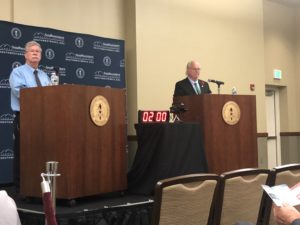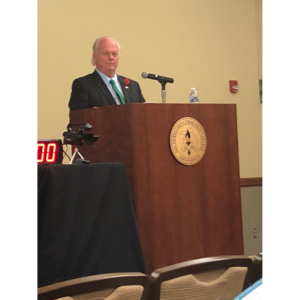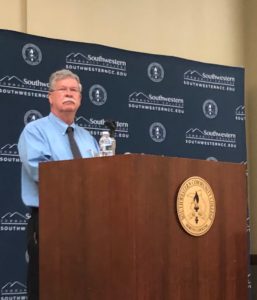
Republican incumbent Mike Clampitt (left) and Democrat Joe Sam Queen (right) prepare to give their opening statements at the debate at SCC on Oct. 18, 2018. Photo by Patrick Clemons.
Southwestern Community College hosted a debate on Thursday, Oct. 18, for N.C. General Assembly District 119 incumbent Mike Clampitt (R) and competitor Joe Sam Queen (D) as a platform to persuade voters.
Clampitt was a captain of the Charlotte Fire Department from 1977-2004. He has previously run for office for Swain Board of Commissioners and N.C. General Assembly. Clampitt was elected to the N.C. House of Representatives in 2016. In 2018, N.C. Values Coalition Scorecard listed him as a Champion of the Family with a 90 percent rating, signifying Clampitt’s stance on pro-family values.
Queen was a member of the N.C. Senate in the 47th district from 2003-2005 and then again from 2007-2011. He was then a member of the N.C. House of Representatives from 2013-2016. He was one of the leaders when it came to broadening Medicaid across North Carolina. Queen also supports raising teacher pay and is against fracking in North Carolina.
The debate was held in the Burrell Conference Center on SCC’s Jackson Campus with questions posed by their Social Problems class. It lasted over an hour with questions on teacher pay, gerrymandering, internet, Duke Energy, marijuana, mental health, substance abuse and constitutional amendments, focusing primarily on voter ID and state income tax. All seats were filled with students and other residents of the state. Attendees were requested to remain silent throughout the debate.
Teacher Pay
“North Carolina is the 10th most populated state, but our average teacher pay rank is 39th and our spending per pupil average is 37th in the nation. Explain what you think should be done to improve the North Carolina public education system,” asked SCC student Joshua McEntire.
“In the two years I’ve been down there, we increased teacher pay an average of 10 percent. We also increased education funding by $1 billion dollars. We also prioritized school safety increasing school safety initiatives by another $35 million dollars,” Clampitt said. The full budget bill can be found here.
“I met with Chancellor Belcher a couple years ago in his office and he opened up his books for Jim Davis and I, and said, fellas, you know you want us to be the greatest university system in the nation and you’ve cut us 25 percent and those cuts have continued so we need to not give the wealthy big tax cuts and we need to invest in our citizens’ education,” Queen said.
Clampitt claimed when Queen was elected, 3,000 teachers were laid off and cut spending by over $225 million.
Queen acknowledged Clampitt’s claim, but said he was not in the N.C. General Assembly in 2011 when those cuts were made.
According to the Public Schools First NC, a statewide nonpartisan, nonprofit organization focused on pre-K – 12 public education issues, the budget bill for 2018-19 does have some increases in the salary but also some caveats. As they point out
- $11.8 million is allocated to fund salary increases for teachers. The average teacher raise is 6.5 percent. The teacher salary schedule starts at $3,500 per month and increases by $100 for each year of service until 15 years. Between years 15-24, teachers would earn $5,000 per month. This rate is frozen until teachers reach 25 years of service. At 25+ years, the monthly salary would be $5,200 per month.
- This budget eliminates $5 million dollars for veteran teacher bonuses.
- $12 million is allocated for a principal pay increase and tied to test performance. The base salary schedule for principals is determined by the average daily membership (ADM) and whether or not their school failed to meet, met, or exceeded growth.
See more on their analysis.
Gerrymandering
“A federal court has ruled that 12 of North Carolina’s 13 congressional districts were gerrymandered in a partisan and unconstitutional manner, do you think it is acceptable to use these unconstitutional districts in this year’s elections?” asked SCC student Tristin Goode.

Democrat, Joe Sam Queen prepares for his opening statement during the SCC debate, Oct. 18 in Sylva, North Carolina. Photo by Patrick Clemons.
“I certainly don’t think it is, but I’m not the one that makes that ruling so we’re going to run the election on the maps that we have,” Queen said. “If I go down and I have a chance to vote on redistricting, I will definitely vote for a nonpartisan or bipartisan approach so that the citizens get a fair chance to elect the representatives they choose.”
“The state constitution allowed the legislatures to draw the districts, that’s our constitution, that’s what it says, that’s what we have done and as far as allowing the vote to take this year based on the districts, yes,” Clampitt said.
Clampitt thinks that there is no issue of gerrymandering with these maps and this issue is only being brought up because Republicans are the majority.
The U.S. Supreme Court determined old North Carolina maps from 2011 to be an unconstitutional racial gerrymander that put the state’s black voters at a disadvantage. In 2016, it was determined the North Carolina maps were an unconstitutional partisan gerrymander favoring Republicans. More information on gerrymandering in North Carolina can be found here.
Internet
“Most people who like broadband internet connection in North Carolina live in rural areas like our mountain counties, do you think it is important to connect our rural areas to the modern internet and what do you think should be done about it?” asked SCC student Kayla Postell.
“It’s going to take a process of being able to reduce the regulations, which we have cut back over 600 regulations in the statehouse since we’ve been down there,” said Clampitt speaking of regulations put on companies by North Carolina regarding where and how broadband internet can be installed.
He also said another difficulty in the process is how many people are in certain areas and where they live, which makes the cost for the state go higher.
Queen then got heated due to Clampitt’s claims of how long the process will take.
“Mr. Clampitt says we can’t do it. We can do it next year. He talks about regulation, all we have to do is open the regulation that’s protecting the big boys, Verizon, AT&T, Charter, Duke Energy and start using the internet for the public good like any utility,” Queen said.
According to the State Broadband Plan, “The plan’s overarching goal is for every North Carolinian to have affordable access to broadband service—wireline or wireless—if they so choose, by June 2021.”
Six Constitutional Amendments
“A number of the current proposed constitutional amendments on this year’s ballot allow the legislature to write the details of the amendment after it is passed. Do you think it is wise to pass constitutional amendments without having the amendments completely written and without knowing exactly what is contained in those amendments?” asked SCC student Alyssa Collins.
“Every amendment that is on the ballot was bedded through the House and the Senate before it was voted to be put on ballot and the verbiage was written to be able to make it as simple and concise as possible so people could understand it without having to read several pages of legal jargon that we usually have in the House and the Senate on stuff,” Clampitt said.
Before replying, Queen said, “Mr. Clampitt and I couldn’t be further apart on this.”
“It’s all politically motivated, every one of them. There’s not a reason for any of them. None of them have been vetted in the legislatures. There’s not a bill on any of them. They don’t even have numbers on some of them, so you can’t even tell which one you’re talking about.”
The first amendment of concern was about voter ID. This amendment would require a photo ID to vote in elections.
“An audit by the N.C. State Board of Elections found one occurrence of voter fraud out of nearly 5 million votes cast in the 2016 General Election. That would have been prevented by requiring a photo ID. In that case, a woman for Donald Trump on her deceased mother’s behalf because her mom was a huge Trump fan and passed away just days before the election. With that in mind, do you think it is necessary or even wise, to pass a constitutional amendment requiring a photo ID to vote with the intended costs?” asked SCC student Gabriel Sessoms.
“I don’t think a photo ID is a good idea for North Carolina. Our judicial system has ruled it unconstitutional,” Queen said. “We need to make it easier for people to vote and fraud is not the issue at all. They have one motive and that’s political advantage. They’re willing to take away your constitutional rights to vote for their political advantage and that’s really what they’re doing and that’s why they’re having to do it with a constitutional amendment.”

Republican incumbent, Mike Clampitt, prepares for his opening statement at the SCC debate on Oct. 18 in Sylva, North Carolina. Photo by Patrick Clemons. .
“Well, I was a cosponsor of the voter ID bill and I’m going to ask you to vote for it. The reason I want to ask you to vote for it is, I don’t want to have your vote canceled out by someone who impersonates you at some point,” Clampitt said. “35 other states have voter ID, why does North Carolina have to be different.”
Clampitt also wondered how these same people that can’t get an ID, can get prescriptions and other goods that require an ID for purchase.
Queen noted you can’t use your Western Carolina University or any university ID to vote. You have to get another form of photo identification. According to the National Conference of State Legislatures website, “a valid student ID card” is an acceptable form of identification.
The second amendment of concern is the state income tax cap, which would cap the state income tax percentage at 7 percent.
“Do you support a constitutional capping the maximum state income tax at seven percent?” asked SCC student Nicholas Jacobs.
“I don’t. It’s not necessary to cap our tax. This is all coming down from the richest folks in America that are running this agenda,” Queen said.
“I was for 5.5, not to seven. The reason I was for 5.5 is, It was a step down from doing away with the state income tax. When I say do away with the state income tax, we’re looking at having the opportunity of individuals from other states from Florida and Tennessee that don’t pay income tax to becoming year-round residents and not just have them six months out of the year. They would be here year-round. We would be getting their sales tax and their other taxes, so it would benefit North Carolina with that,” Clampitt said.
The other amendment topics not covered include the right to hunt, fish and harvest wildlife, rights of victims of crime, Bipartisan State Board of Ethics and Elections Enforcement and selection for judicial vacancies. Descriptions of all six amendments can be found here.
Duke Energy
“Since 2014, Duke Energy has spent nearly $550 million dollars on coal ash cleanup around North Carolina. Earlier this summer, the State Regulatory Board gave Duke Energy to pass nearly 90 percent of those costs onto its customers instead of its shareholders by raising people’s electric bill. Do you think this rate increase should have been allowed or should Duke Energy pay the bill for cleaning up their pollution?” asked another SCC student.
“I absolutely think Duke Energy should pay for their own misbehavior,” Queen said.
Clampitt agreed with Queen’s response, but blamed him and other Democrats for the problem and how he and the Republicans now take the blame.
“That by his own admission, Mr. Queen says it was not politically popular to decide who was going to pay for that when they were down there making these studies. So, we get dumped on because we’re in office down there now because they couldn’t make a decision,” said Clampitt referring to a committee that was formed to investigate the issue further and would advise others how to vote regarding who should pay for the cleanup.
State regulators approved a 16.7 percent rate hike, which added an average of $18 to customer’s electric bills.
Marijuana
“North Carolina allows and regulates the selling of alcohol, but not marijuana even though alcohol is much more strongly connected to medical problems and violence. Yesterday, the entire nation of Canada legalized the adult use of marijuana. With all of that in mind, do you think it makes sense to allow the regulation and use of marijuana for use,” asked SCC student Jeff Redman.
On this topic, both candidates had fairly the same views, but Queen seemed to be more lenient than Clampitt.
“I will not support and will not engage in any legalization of recreational marijuana in the state of North Carolina. I will not do that. That’s not to say that medical cannabis does not have a place in North Carolina and nationwide,” Clampitt said.
“What I would tell you about legalizing marijuana in the state of North Carolina is we’re not ready to go there in this state in my opinion. A number of states have tried it, now Canada is going to try it. Let’s let the consequences be judged and find what the consequences are. See if we want to consider it,” Queen said.
This discussion of this topic has grown in recent years, but has gained more traction since Canada recently legalized recreational marijuana.
Mental Health / Substance Abuse
“Due to a lack of inpatient treatment facilities, emergency rooms are having to board patients experiencing mental health and substance abuse crisis even though the staff have no psychiatric training. In comparison to other states, North Carolina sees nearly twice the rate of psychiatric and substance abuse patients who can resort to the ER and the unpaid bills increase costs for other customers. What do you think should be done about the significant statewide problem and the mental health and substance abuse epidemic?” asked SCC student Hannah Ledford.
In this case, both candidates acknowledged the problem, but have different solutions when it comes to Medicaid
“We need to expand Medicaid. That includes mental health. It includes substance abuse. It includes preventative health. It includes primary health and it brings real dollars to the table to help our sheriffs deal with the addicted that they are trying to lockup and they say we cannot fix these people in the jail. We need to fix them in a facility that offers mental health services for them because addiction is a mental health problem,” Queen said.
“Just so you know, if we did expand Medicaid to an estimated 500,000 people, it puts low income, parents, children, pregnant women, elderly, blind and disabled in to compete for their healthcare with these other groups. It takes away a level playing field and gives priority on that,” Clampitt said.
This a serious issue for North Carolina since rates of mental-health visits to hospitals have increased as well as suicides, which shows the state is not making progress on their ten-year target goal for mental health.
This was the second of three debates hosted by SCC. The final debate will take place on Thursday, Oct. 25 for N.C. State Senate candidates Jim Davis and Robert Kuppers. Video of the debate and others hosted by SCC can be viewed here. Mid-term election season has already begun with early voting ending Saturday, Nov. 3 and Election Day occurring on Tuesday, Nov. 6. The deadline to request an absentee ballot is Tuesday, Oct. 30.


